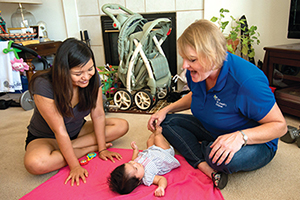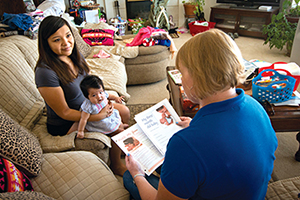By BETSY TAYLOR
New Mexico ranks 49th in the nation for child well-being, according to the Annie E. Casey 2015 KIDS COUNT Data Book: State Trends in Child Well-Being. New Mexico sometimes flip-flops spots on the bottom of this list with Mississippi, said Allen Sanchez, president of CHI St. Joseph's Children.

Photo by David Nufer/courtesy of CHI St. Joseph's Children
CHI St. Joseph's Children, a health ministry in Albuquerque, N.M., believes one of the best ways to improve the lot of children is to teach parents about early childhood health and development during what science and the organization call "the most important period of early brain development," from prenatal care through age 3. It has built one of the largest privately-run, home-based early childhood education programs in the nation to accomplish that end.
The health ministry is supported by an endowment, created when Catholic Health Initiatives (of which the Sisters of Charity of Cincinnati are a founding member) sold the former St. Joseph Healthcare System in 2002. The endowment has been singularly focused on early childhood development since 2010.
"What happens in your early childhood years impacts you for your whole life," said Dianne Wagemann, director of home visiting and enhanced referral programs for CHI St. Joseph's Children.
With that in mind, the ministry deploys dozens of early childhood educators it calls "home visitors" to teach first-time parents how to play, interact and have fun with their children, emphasizing the importance of regular reading and talking with their children to promote healthy development. The educators take their lead from parents, answering questions related to raising a physically, mentally and emotionally healthy child.

Photo by David Nufer/courtesy of CHI St. Joseph's Children
The educators, who have either a master's, bachelor's, associate's degree, certification and/or significant professional experience in a field like early childhood education, go through an additional six weeks of training in preparation for the home visits. They work on building a variety of skills, including increasing their knowledge in brain development, listening skills and how to relay information to the new parents in a supportive, nonjudgmental manner.
Beyond education
In addition to 41 employees who make home visits, CHI St. Joseph's Children also employs four enhanced referral specialists, who link parents to community programs or resources to assist them with other needs they may have, such as finding safe, affordable housing, adequate health insurance or medical homes for themselves and their infant or toddler. "It's a comprehensive approach" to supporting a family's efforts to build a nurturing family and home, Wagemann said.
The program is open to any first-time parents beginning in the pregnancy through a child's first month of life. It is offered at no cost to the participants. "Right now we're serving families of all kinds, including homeless families and at least one family where both parents possess a Ph.D.," Wagemann said. (The home visitors sometimes meet homeless families in offices, restaurants, libraries and other community locations.) "We work with about 500 families a week," she said. The early childhood educators meet with individual families an hour a week beginning with the pregnancy. When the child approaches his or her second birthday, the visits usually taper off to one about every other week, and then at 2 perhaps once a month until age 3, depending on a family's requirements, Wagemann said.
Building trust
Amber Epaloose of Albuquerque signed up for the home visiting program on her cousin's recommendation. Candy Jardine, who has a master's degree in early childhood and special education, began meeting with Epaloose during her pregnancy, answering her questions about prenatal health. Since the birth of Epaloose's daughter, Leah Garcia, earlier this year, Jardine has met with Epaloose and the baby's father to address concerns related to feeding, sleep, colic and child development.
"I'm a first-time parent," said Epaloose, age 22. "There's a lot I didn't know."
Jardine talks about normal childhood development during the home visits and offers tips on how to console and soothe Leah when food or a dry diaper doesn't do the trick. She talks with new parents about how to keep their own anxiety and frustration in check during a sleepless night.
Jardine tells families it's important to respond to a crying baby and try to meet the baby's needs to build a sense of trust and security in the child. She tells parents it's also fine to take a breather, to lay a baby down in the crib and take a few minutes away from the crying child.
Epaloose said Jardine reassures her she has the right instincts and is doing the right things as a new mother. "She cares about us as a family. She's very invested," Epaloose said.
Baby talk
CHI St. Joseph's Children uses the First Born Curriculum, which tracks a child's development, and Partners for a Healthy Baby, which recognizes parents as a child's first teachers, Jardine said. For instance, parents learn about why it's important to talk to and read to their babies to advance their child's verbal and comprehension skills. They learn simple games to encourage motor skills. The home visitors leave written materials for parents to refer back to at the end of a visit, such as information about basic dental care. When West Nile virus was found in New Mexico this year, the educators provided families with fact sheets about reducing a child's likelihood of getting mosquito bites and what repellants shouldn't be used on young children.
When a child doesn't reach a developmental stage at the appropriate time, the home visitor may suggest a referral for an outside medical evaluation. In some cases, the home visitor reassesses the child during another visit to see if progress has been made.
Evaluating the program
Researchers from the University of New Mexico, led by Paul Guerin, senior research scientist at the university's Institute for Social Research, released a two-year report in April assessing the program for CHI St. Joseph's Children. "At the program's core is the conviction that a healthy pregnancy and a healthy baby are not only critical to the immediate well-being of mother and child, but are also integral to the long-term health and success of the family and community," the report said.
Researchers found CHI St. Joseph's Children is consistent in its use of evidence-based practices in its home visiting program. For instance, the study found the program's early childhood educators build trusting relationships with their clients, perform age-appropriate screenings and assessments during home visits and that the majority of educators worked together with the ministry's referral specialists either "sometimes" or "often" to assist families with their needs.
Next up, the University of New Mexico researchers will determine the long-term and short-term effectiveness of the CHI St. Joseph's Children program model in a longitudinal study following children through 18 years of age. The study will examine several areas including maternal and child health, development and school readiness, family economic self-sufficiency and more.
Jardine said she sees the benefits of the home visits as parents realize they're the experts on their own children. "For me, personally, it's (about) watching families become confident in their own knowledge and ability," she said.
